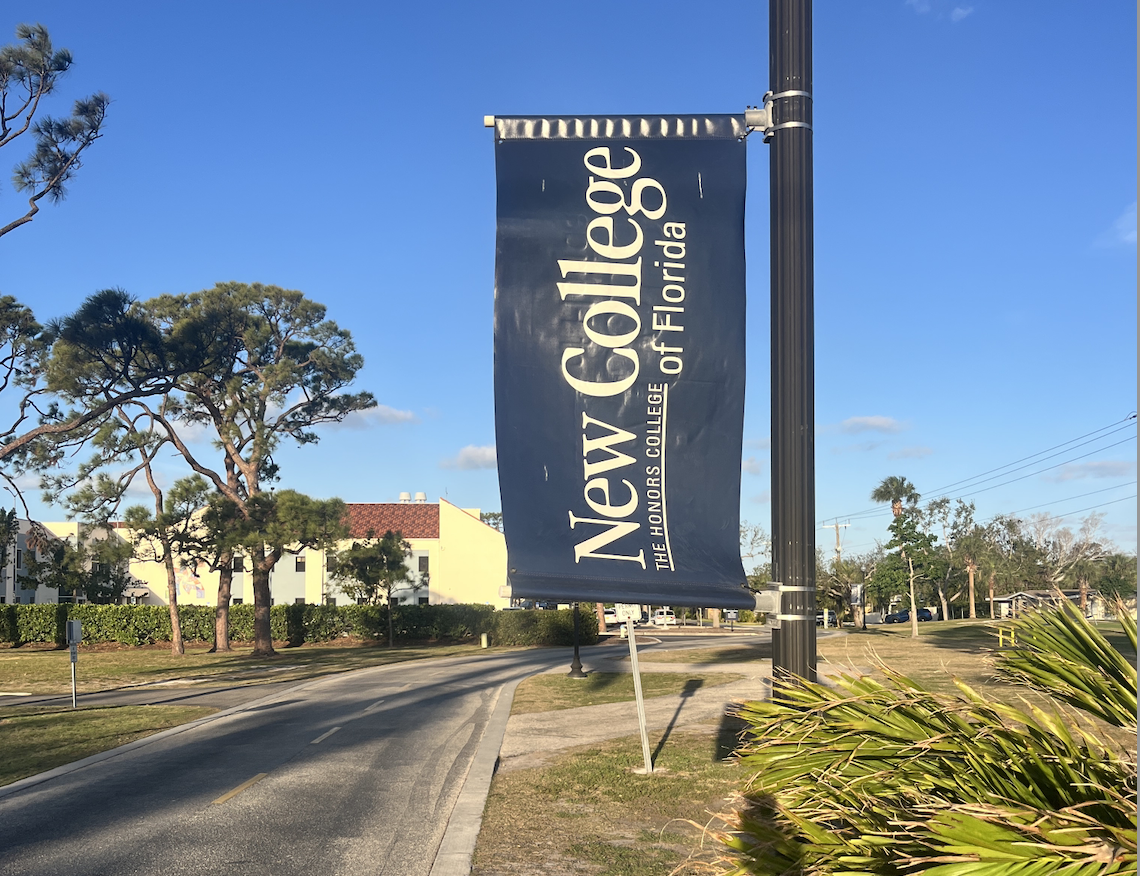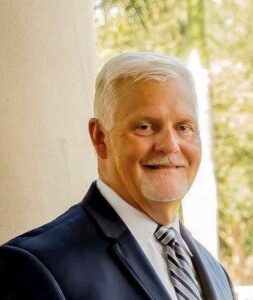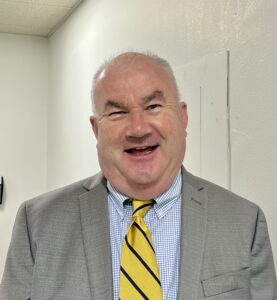
Former New College Foundation board members have sought transparency from the college. | Photo by Emily Le Coz, Suncoast Searchlight.
Inside New College’s unraveling financial oversight: Staff ousted, board critics removed
Two former top finance officers at the New College Foundation say they were ousted in 2023 after pushing back against college administrators who sought to use donor-restricted funds to cover President Richard Corcoran’s salary and benefits — a move they said would violate the terms of the donations.
Ron McDonough, the foundation’s former director of finance, and Declan Sheehy, former director of philanthropy, said they warned administrators not to misuse a major gift — the largest donation in the school’s history — which they said was not intended to fund administrative salaries.
Both said their contracts were terminated after they raised concerns internally.
“The college was trying to find the money to pay the president,” McDonough said. “And I kept on going back, saying, ‘We don’t have this unrestricted money.’”
The accounts of their final days on the job, shared publicly for the first time with Suncoast Searchlight, come as former foundation board members and alumni demand greater transparency and accountability from New College amid rising costs and sweeping institutional change.
Since Gov. Ron DeSantis appointed a new slate of trustees in early 2023, the small liberal arts college has undergone a dramatic transformation — eliminating its Gender Studies program, reshaping student life, and launching a costly new athletics department. Critics say the administration has also sidelined financial safeguards, raising questions about whether the college is honoring donor intent and maintaining public trust.
Last month, a group of former foundation board members sent Corcoran and New College Foundation executive director Sydney Gruters a demand letter requesting an audit of how restricted donor funds were used and threatening legal action if they do not comply. The letter follows a string of high-profile board resignations and dismissals, including those who held key financial oversight roles.
Their exits, and the college’s move last year to hand Corcoran the unilateral power to fire foundation board members, have deepened fears that independent checks on the foundation’s spending are being systematically dismantled.
A “direct support organization” with close ties to New College, the foundation has never operated independently of the school. But in giving the college president the power to unilaterally remove board members last year, the Board of Trustees further eroded its autonomy.
“Good governance is not a side item,” said Hazel Bradford, a former foundation board member who sat on the organization’s investments committee and resigned in April, citing concerns about the college’s handling of the foundation. “It’s the beginning and end of any foundation handling other people’s money.”
A New College spokesperson said via email that the college does not comment on matters relating to former staff or board members but instead attached a May 27 letter addressed to former foundation board member Ben Brown.
The letter, written by New College Vice President for Legal Affairs David Brickhouse, pushed back on allegations of financial mismanagement, citing a recent “clean audit” from the Florida Auditor General and said that donations to the foundation “have surged, with over $5 million secured this fiscal year.”
As expenses climb, foundation funds fill the gap
After the DeSantis-backed overhaul of the Board of Trustees, New College named Corcoran president in early 2023, approving a compensation package that made him the highest-paid president in the college’s history —earning more than $1 million a year in salary and perks.
Because state law limits taxpayer funding for university administrator compensation to $200,000 — an amount that covered only the first four months of Corcoran’s salary — New College has turned to its foundation, which manages the school’s endowment and donor funds, to make up the difference.
“Corcoran’s salary is not a one-time thing,” said McDonough. “It’s not sustainable.”

Ron McDonough, former New College Foundation director of finance, says he fought to protect restricted donor funds before his contract was terminated in spring 2023. | Photo courtesy of Ron McDonough
The college holds a total endowment of $50 million, the vast majority of which donor-restricted.
McDonough and Sheehy said college personnel, including Christie Fitz-Patrick, then the school’s associate vice president of government relations, specifically inquired about using the Peterson Trust – a gift bestowed to the school in 2021 from the estate of the late Sarasota philanthropists Robert “Bob” and Pasqualina “Lee” Peterson.
The largest donation in New College’s history, half of the Peterson donation was originally slated to go to student aid, with the rest being directed to career programs, student affairs and campus activities, former New College president Donal O’Shea told the Bradenton Herald in 2021. The money, O’Shea told the paper, would allow the college to help cover tuition for “our neediest students.”
Suncoast Searchlight reached out to a son of the Petersons but did not receive a response.
In contemporaneous notes shared with Suncoast Searchlight, Sheehy wrote that in early 2023, the trust was suddenly on the table as a potential source of funding for a very different purpose.
During a Feb. 22, 2023, meeting with McDonough and Fitz-Patrick, Sheehy wrote, the three “discussed plans to fund Richard Corcoran’s salary.” Sheehy “reiterated that the Peterson funds had restrictions on their use and should not be considered available for any other use.”
Sheehy added: “the donors’ intent was not to use this gift for overhead.”
Donor intent is “paramount” in nonprofit financial management, said John Griswold, founder of the asset management research group Commonfund Institute and a specialist in nonprofit endowments. Donor funds in higher education, he said, “usually are [for] scholarship, for faculty support or named programs, and so the administration must be very cautious in using funds from the endowment.”
Griswold also said it’s not uncommon for incoming college administrators to seek greater control over the institution’s endowment.
“There have been instances, in many cases, where there’s a change in the administration – a new president, new cabinet coming in – and they see the need for spending on all kinds of projects to further their strategy,” Griswold said. “You’re running the organization, the institution, and the endowment seems to be a convenient place to get some of the funding for that. But again, the donors’ wishes prevail.”
Fitz-Patrick did not respond to multiple requests for comment.

Declan Sheehy, former director of philanthropy for the New College Foundation, told administrators not to use a major donor gift to pay for Richard Corcoran’s salary. | Photo courtesy of Declan Sheehy
According to his notes, during two subsequent meetings with college staff and members of the Foundation board, Sheehy stated, again, that restrictions had been placed on the Peterson trust and other funds held by the school. During a March 17, 2023, foundation board meeting, Sheehy reintroduced the topic of restricted donor funds, stressing the importance of maintaining donor trust.
Three days later, during a meeting with human resources and the legal counsel to the Board of Trustees, Sheehy said he was told his contract would be cancelled. McDonough’s contract was terminated days later.
Critics say New College dismantled oversight to control foundation money
After the ousters of Sheehy and McDonough, concerns about the handling of donor funds did not subside. Instead, members of the college’s foundation board continued to press for greater transparency surrounding restricted donor funds. In time, two of the most outspoken among them would also be removed.
Beyond Corcoran’s salary, new expenses have mounted, including the college’s emerging athletics program – a marquee project of the new administration, and a costly one.
Because Florida requires university athletics to be “self-supported” — through student athletics fees, ticket sales and Title IX funds — much of the athletics program must come from the foundation. In the first year, New College operating budget documents show the foundation delivered $400,000 toward the athletics program; for fiscal year 2024-2025, the school budgeted $1 million from the foundation.
As those expenses added up, members of the board raised concerns about the foundation’s ability to find the necessary funding to cover them — reflecting the criticisms initially raised by Sheehy and McDonough.
Former foundation board members Susan Burns and Larry Geimer were especially outspoken, repeatedly introducing the topic at public board meetings.
Geimer told Suncoast Searchlight he advocated for an inquiry into donor agreements and other records indicating how the organization’s many funds were intended to be spent – but that he was ignored.
“I said, ‘If we don’t have [the records], can we reach back to those individuals or to those families to see what they have?’” said Geimer. “And that request fell on deaf ears.”
Burns brought her concerns to the board’s audit committee in July 2024, telling committee members that Geimer had not been receiving monthly financial statements and that taking action was their fiduciary responsibility.
Geimer also told Suncoast Searchlight that he stopped receiving financial statements from foundation staff after Corcoran’s appointment.
Among the motions, Burns suggested requesting a working list of restricted and unrestricted funds, a list of funds whose status was then unknown, and an accounting of any steps staff had taken to track down missing donor agreements. The committee approved the motions.
“Thank you all!” wrote Fermin “JJ” Miranda, the chair of the committee, after the meeting, in an email obtained by Suncoast Searchlight. “Great start, we have a lot of work ahead of us, but it is WORTH IT!”
But the motions never came before the full foundation board. In September, the college released an internal audit citing past financial mismanagement — giving administrators cover to remove two of the board’s most vocal critics.
On Nov. 20, newly armed with the authority to remove foundation board members without cause — a power granted by trustees just a day earlier — Corcoran swiftly dismissed Geimer and Burns, a move administrators attributed to the internal audit report.
After learning the alleged reason for her firing, Burns emailed Corcoran directly, asking for evidence of wrongdoing: “My name and reputation are involved,” Burns wrote in the Dec. 9 email.
In his reply, Corcoran wrote, “I do not agree with your assessment,” and added that board members can be fired without cause.
In an interview, Burns told Suncoast Searchlight she was left to wonder if she was dismissed for asking too many questions.
The college’s push to wrest control of the foundation and oust internal critics has spurred more resignations.
On March 24, Ben Brown, former chair of the Alumni Association who sat on the foundation board, resigned from his position, writing that “the new institutional structure works against the possibility of checks-and-balances” and rendered the alumni position meaningless.
Hazel Bradford, a veteran finance reporter and former member of the foundation’s investment committee, told Suncoast Searchlight she was “dismayed” about the trustees’ decision to grant the president so much control over the board. She cited the change while delivering her resignation at an April foundation board meeting.
“Given the corporate governance changes last year, I cannot in good conscience stay on the board,” said Bradford, who offered to continue to help in an unofficial capacity.
“Just remember,” she warned, “you’re all fiduciaries.”
Brown and Bradford both signed onto a demand letter and draft complaint in May seeking an accounting of the foundation’s use of restricted funds. If the college refuses their demands – or does not respond – by June 5, the former board members say they will sue by the end of the month.
“The rumors and the talks about how donor money is used, or has been used, or is still being used — it’s still a big question mark for me,” Sheehy said. “I haven’t seen — I don’t think anybody has seen — actual reports of what actually happened from anybody. Because I think the former board (was) looking for that information. They just couldn’t get it.”
Alice Herman is an investigative/watchdog reporter for Suncoast Searchlight, a nonprofit newsroom of the Community News Collaborative serving Sarasota, Manatee, and DeSoto counties. Learn more at suncoastsearchlight.org.


